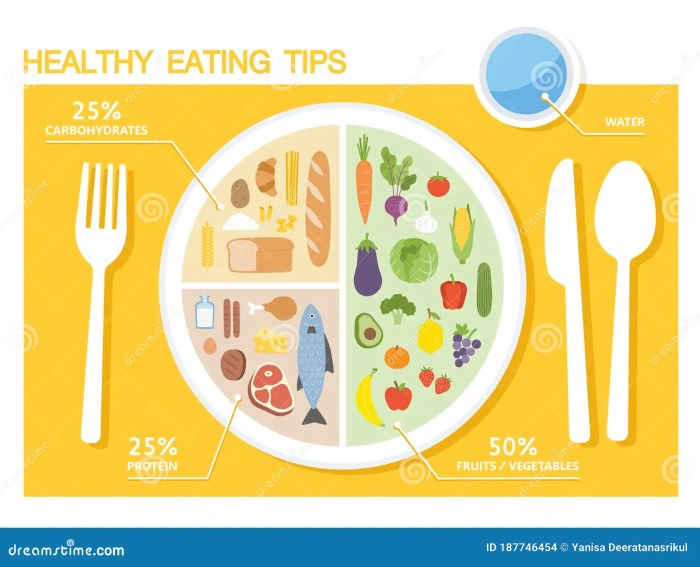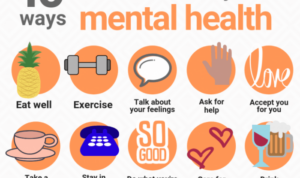Kicking off with Balanced Diet Tips, this guide is all about keeping it real and fresh when it comes to eating right. From understanding the importance of a balanced diet to nailing down the components and tips, we’ve got you covered with the latest scoop on how to level up your nutrition game.
So, grab your smoothie and let’s dive into the world of balanced eating that’s not just about salads and quinoa bowls, but a whole vibe for a healthier you.
Importance of a Balanced Diet

Eating a balanced diet is essential for maintaining overall health and well-being. It provides the necessary nutrients that our bodies need to function properly and stay healthy.
Health Benefits of a Balanced Diet
- Supports proper growth and development
- Boosts immune system to fight off infections
- Reduces the risk of chronic diseases such as heart disease, diabetes, and cancer
- Improves digestion and nutrient absorption
Impact on Energy Levels and Mood
A balanced diet plays a significant role in regulating energy levels throughout the day. By providing a mix of carbohydrates, proteins, fats, vitamins, and minerals, it helps sustain energy levels and prevent crashes. Additionally, consuming a variety of nutrient-rich foods can positively impact mood and mental well-being, reducing the risk of mood swings and promoting overall emotional stability.
Components of a Balanced Diet

Eating a balanced diet involves consuming a variety of foods that provide essential nutrients to support overall health. Let’s break down the key components that make up a balanced diet:
Essential Food Groups
- Carbohydrates: Carbs are the body’s main source of energy and should make up a significant portion of your daily intake. Opt for whole grains, fruits, and vegetables for complex carbohydrates.
- Proteins: Proteins are crucial for building and repairing tissues in the body. Include sources like lean meats, poultry, fish, beans, and nuts in your diet.
- Fats: Healthy fats are necessary for brain function and hormone production. Choose sources like avocados, nuts, seeds, and olive oil for unsaturated fats.
- Vitamins: Vitamins play a vital role in various bodily functions, such as immune support and energy production. Ensure you get a variety of vitamins from fruits, vegetables, and supplements if necessary.
- Minerals: Minerals like calcium, iron, and potassium are essential for maintaining bone health, oxygen transport, and electrolyte balance. Incorporate foods like dairy products, leafy greens, and legumes to meet your mineral needs.
Role of Nutrients
- Carbohydrates provide energy to fuel your daily activities and exercise.
- Proteins are the building blocks of muscles, skin, and other body tissues.
- Fats help absorb vitamins, insulate body organs, and provide energy.
- Vitamins and minerals support immune function, cell production, and overall health.
Portion Control and Moderation
Maintaining a balanced diet also involves portion control and moderation. Pay attention to serving sizes, avoid oversized portions, and listen to your body’s hunger and fullness cues. Balancing your intake of different food groups and watching your portion sizes can help prevent overeating and promote a healthier lifestyle.
Tips for Achieving a Balanced Diet: Balanced Diet Tips
Eating a balanced diet is essential for maintaining good health and overall well-being. Here are some tips to help you achieve a balanced diet:
Meal Planning Strategies
Meal planning is a key component of achieving a balanced diet. By planning your meals in advance, you can ensure that you are incorporating a variety of nutrients into your diet. Try to include a mix of fruits, vegetables, whole grains, lean proteins, and healthy fats in each meal.
‘Eating the Rainbow’
One popular concept in achieving a balanced diet is ‘eating the rainbow.’ This means incorporating a variety of colorful fruits and vegetables into your meals. Different colors indicate different nutrients, so by eating a rainbow of produce, you can ensure you are getting a wide range of vitamins and minerals.
Reading Nutrition Labels, Balanced Diet Tips
Learning how to read nutrition labels can help you make healthier food choices. Pay attention to serving sizes, calories, and the amount of nutrients like fats, sugars, and sodium in the food. Opt for foods that are lower in unhealthy fats and sugars, and higher in essential nutrients like fiber and protein.
Common Mistakes to Avoid
When aiming for a balanced diet, it’s crucial to steer clear of common pitfalls that can derail your efforts. These mistakes can lead to an unbalanced intake of nutrients and hinder your overall health and well-being.
Risks of Excessive Consumption of Processed Foods and Sugary Beverages
Processed foods and sugary beverages are often packed with unhealthy fats, sugars, and additives that offer little to no nutritional value. Consuming these items in excess can lead to weight gain, increased risk of chronic diseases like diabetes and heart disease, and overall poor health. To maintain a balanced diet, it’s essential to limit your intake of processed foods and sugary beverages. Opt for whole, unprocessed foods like fruits, vegetables, lean proteins, and whole grains instead.
Tips on Overcoming Cravings and Maintaining a Balanced Diet in Social Settings
Cravings can often tempt us to veer off course from our balanced diet goals, especially in social settings where unhealthy food options may be abundant. To combat cravings, try to identify the root cause of your cravings – whether it’s emotional, physiological, or situational. Find healthier alternatives to satisfy your cravings, such as swapping out chips for air-popped popcorn or sugary drinks for herbal tea. When dining out with friends or attending social gatherings, make mindful choices by opting for healthier menu options, sharing dishes to control portion sizes, and staying hydrated with water instead of sugary beverages. Remember, balance is key, so allow yourself to indulge occasionally while prioritizing nutrient-dense foods for the majority of your meals.


